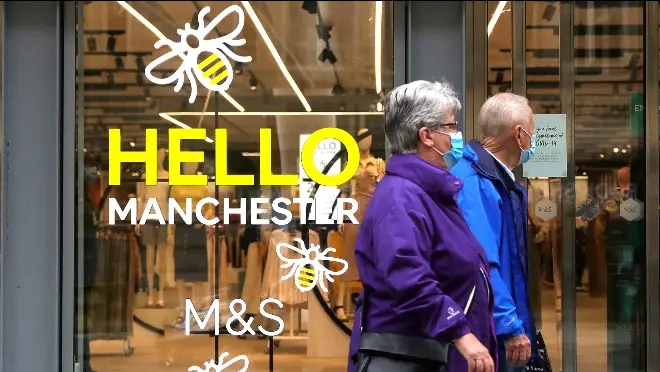
Paul Brand 7am - 10am
4 August 2020, 22:44

Lockdown laws in parts of northern England including Manchester, West Yorkshire and areas in east Lancashire have now officially come into force.
The legislation was published on Tuesday afternoon and begun affecting residents from midnight onwards, despite ministers previously saying it would come into effect from 31 July.
Fines of up to £100 will be enforceable for anyone who breaks the rules of the Health Protection (Coronavirus, Restrictions on Gatherings) (North of England) Regulations 2020, with a maximum £3,200 fine for repeat offences.
Officials have not offered an explanation behind the delay in imposing the laws and on what legal basis they had been enforced for the first five days of the measures.
Human rights barrister Adam Wagner, commenting on the legislation on Twitter, said: "They come into force and do not (cannot) apply to anything which happened before that."
Read more: Blackburn council sets up own contact tracing system blaming Government failure
Read more: Six million rural workers 'at risk' of losing job after furlough scheme ends

Nick Ferrari asks Matt Hancock about new lockdown rules in north
Restrictions apply to metropolitan, city and borough council areas in Bolton, Bury, Manchester, Oldham, Rochdale, Salford, Stockport, Tameside, Trafford, Wigan, Burnley, Hyndburn, Pendle, Rossendale, Calderdale and Kirklees.
However, papers detailing the legislation explained that the restriction zone could be modified at any time as directed by Health Secretary Matt Hancock.
Existing laws for Blackburn with Darwen and Bradford have also been updated in the Regulations, meaning those areas are now subject to the same measures.
They were initially governed by less restrictive legislation which was published on Friday and came into force on Saturday.
The latest laws also prohibit people from meeting others from different households in areas outside the lockdown zone, such as at homes in nearby towns not subject to the rules.
People are not allowed to meet in groups of more than 30 in public places.
Read more: Coronavirus outbreak linked to Aberdeen pub rises to 32 cases
Read more: Motorist hit with £90 parking fine after taking drive-through coronavirus test

New 90-minute tests for Covid-19 to be rolled out
Critics have branded the laws as a resurgence of the so-called "lockdown sex ban" as the law prohibits encounters between people from different households in their homes or other "private dwellings."
It defines a gathering as "when two or more people are present together in the same place in order to engage in any form of social interaction with each other, or to undertake any other activity with each other."
Mr Wagner described this as "crazy times where the criminal law is this intrusive on private rights."
The ban does not extend to places such as hotels, campsites and guest houses or include other buildings such as care homes.
There are several exemptions to the rules, including: for those who have formed a support bubble and have become "linked" households; for people sharing childcare duties; in order to go to work; to attend a birth at the mother's request; to visit a dying loved one; to fulfil a legal obligation; to move house, to care for a vulnerable person or escape injury, illness or risk of harm.
The restrictions must be reviewed once every 14 days and the first must take place by 19 August, however they could be in place for up to six months if not scrapped by the government first.
Listen & subscribe: Global Player | Apple Podcasts | Google Podcasts | Spotify